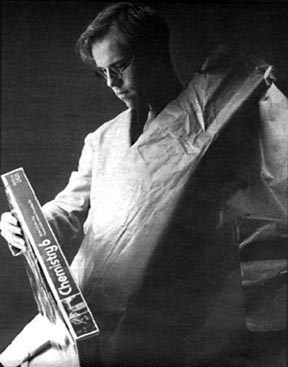|
Summer of 1981 Thomas Dolby had begun assembling his group project Low Noise, with musicians including Kevin Armstrong and Andrew Seligman, as a diversion from his solo stage work. This project would be a creative outlet for some of Dolby's more complex ideas; he desired a more organic energy for one project in particular, his own recording of Joni Mitchell's 'Jungle Line'. "When I first heard Joni Mitchell's 'Jungle Line' about eight years ago it seemed like it was caught in a time warp, almost making an attempt to get over the atmosphere of a previous age. What I liked about it was that it wasn't popularizing something from the past in order to be fashionable. The idea is timeless, but a lot more could've been done musically with the song to get that atmosphere over - and I wanted to create it from scratch. I talked it over with friends and decided I didn't want to be in complete control, I wanted their response to the idea rather than to tell them what to play, so I got the band together quickly and made the record like that. I think Low Noise is something I'll pull back together from time to time, but the idea will always come first. I never want to be in the situation where a certain amount of output is expected from a band."
|
|
Guest Musician Foreigner, '4': "It was always 'wasn't I proud' to be involved in a number one American album. I'm glad it happened, but it means I don't see it as a thrill to have enormous commercial success, it's not fulfilling at all. It would never justify comprimise."
Joan Armatrading, 'Walk Under Ladders': "That was a stroke of luck, I've always really liked her. I couldn't imagine anyone else of that ilk who I'd particularly be a fan of, but I find her very sensuous."
Thoughts on 'Guest Musician' status: "I really enjoy the submissive role, arriving in a studio environment with an ongoing working ambience. But quite often I have to fight to persuade people to give me a free hand in order to get the best mileage out of me. I'm best left to my own devices." |
|||||
|
|
|||||||
|
Exerpts from an October 1981 interview, SOUNDS magazine On his career: "Sometimes I feel very out of control, but I don't particularly regret it. I've had a lot of lucky breaks, I'm a lucky person by nature, things that accidentally come my way somehow miraculously turn into things that after the event I'm glad that's the way they turned out. As long as that keeps happening, I'll be very content. The most difficult thing is to keep that in mind or be susceptible to obvious pressures." On future involvement in films: "I like the idea of working as a subordinate to a filmmaker, and finding possible new forms of expression, as I think cinema is something that will always go on breaking new ground. I like novel situations and I find that I respond to them; the best things I come up with actually emerge when thrust into a situation I don't really understand, so I look out for those things." On collaborating: "I've still got a few unsung heroes who I'm hoping to get the call from, who I'd drop anything for to play with so I can tell my grandchildren about it! For me, there are a few people doing something really important and I'd be very pleased if I could manage to be associated with them in the next five, ten, twenty years."
|

|
On Venice in Peril: "I thought about having a label primarily as an immediate outlet for the different things I wanted to do. The danger was always going to be that I'd get a good idea and it would take months of administrative work to find somebody to believe in it enough to put up the studio time. Anyway, I started thinking about other useful things I could do, and about a name, and I decided that without ever touching a political stance, I'd like to be involved in different causes, because it would enable me to go to places and and meet people who are involved in something different, to steer away from the tendency to get encapsulated in what I was doing... 'Venice in Peril' seemed like a good idea. I thought Venice was one of the most impressive places I've ever been. It's very timeless, because nothing's been built there since the 17th Century, there are no skyscrapers, there's been no civilization. I wanted to try and use some of that timeless imagery in the visual side of what I'm doing, whether it be for videos, films or stills." |
links |
|
1984
- Thomas Dolby in Los Angeles, "The Flat Earth" US tour
continues
|
|
1985 -
Thomas Dolby with Ryuichi Sakamoto
|
|
1986
- Thomas Dolby, collaborations
with Joni Mitchell, work on film scores
|
|
1988
- Thomas Dolby, Mike Kapitan, "Aliens Ate My Buick" and the
Lost Toy People
|
|
1992
- Thomas Dolby, the making of "Astronauts and Heretics"
|
|
|
|
|
|
|